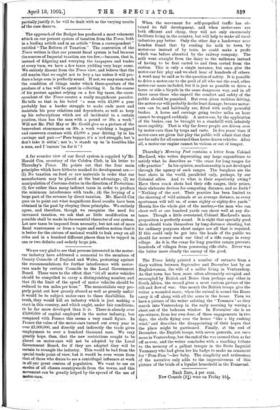When the movement for self-propelled traffic has ob- tained its
'full development, and when motor.cars are 'both efficient and cheap, they will not only enormously facilitate living in the country, but will help to make all rural industries pay better. Only the other- day a landowner near London found that by sending his milk to tOwn by motor-car instead of by train, he could make a profit which was before absorbed by the railway company. The milk went straight from the dairy to the milkman instead of having to be first carted to and then carted from the station. This is only a single instance, but once give the motor-car fair play and we shall hear of hundreds of others. A word may be said as to the question of safety. It is possible to drive a motor-car to the peril of all who use the road, othei motor-car users included, but it is just as possible to drive a horse or ride a bicycle in the same dangerous way, and in all three cases those who imperil the comfort and safety of the public should be punished. But even given reckless driving, the motor-car will probably do the least damage, because motor- cars can be, and habitually are, fitted with really powerful brakes. A horse and carriage going twelve miles an hour cannot be stopped suddenly. A motor-car, by the application of the brakes, can be brought to a standstill with infinitely more rapidity. That is why far fewer people are driven over by motor-cars than by traps and carts. In five years' time if motor-cars are given fair play the public will admit that they are far safer for all concerned than horse-drawn vehicles. After all, a motor-car engine cannot be vicious or out of temper.






































 Previous page
Previous page